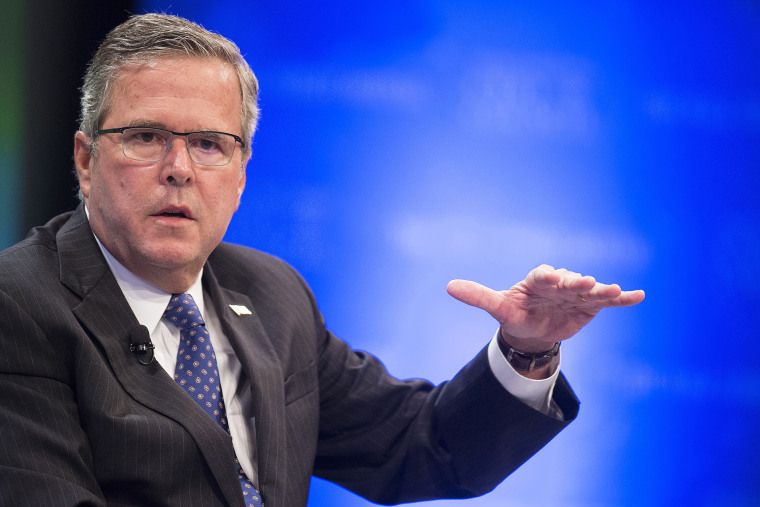Former Florida Gov. John Ellis "Jeb" Bush (R) has given mixed signals of late about his presidential ambitions. On the one hand, the Republican is releasing materials and delivering speeches in ways that suggest he'll be a candidate. On the other, Bush has recently expanded his financial-sector enterprise, and it seemed unlikely he'd walk away from his investors.
This morning, however, the former Florida governor brought some clarity to his plans. Through social media, Jeb Bush explained his family's recent discussions:
"We also talked about the future of our nation. As a result of these conversations and thoughtful consideration of the kind of strong leadership I think America needs, I have decided to actively explore the possibility of running for President of the United States. "In January, I also plan to establish a Leadership PAC that will help me facilitate conversations with citizens across America to discuss the most critical challenges facing our exceptional nation. The PAC's purpose will be to support leaders, ideas and policies that will expand opportunity and prosperity for all Americans."
Note, Bush has not yet launched his presidential campaign, per se. Rather, in an awkward sentence, he's decided to "actively explore the possibility" of running for president.
The next question, of course, then becomes whether Jeb Bush will actually become president.
Consider, for example, his last name. Americans elected Jeb's father, who left office an unpopular one-term president. Americans then elected Jeb's brother, considered by many historians to be among the worst presidents in our nation's history.
"Third time's the charm" is an exceedingly difficult pitch for a presidential candidate.
Even his own mother, when asked about Jeb's possible campaign, said the country has "had enough Bushes."
Perhaps the more immediate challenge will be Bush's disconnect between his agenda and his party's far-right base. The former governor, for example, supports Common Core standards, widely hated by conservative activists. Arguably more important is the fact that Bush supports a pathway to citizenship for undocumented immigrants already in the United States -- a position that the Republican base considers an infuriating deal-breaker.
He's even expressed support for background checks at gun shows, which puts him at odds with the NRA.
Jeb could presumably try abandoning all of his positions and reinventing himself as an entirely new person, but it's probably a little late in the game for a radical, Romney-esque metamorphosis.
We can dig deeper into Bush's prospects as the process unfolds in the coming months, but at first blush, I think there's ample reason for skepticism. Bush hasn't held any public office in eight years, leaving him rusty and a figure from the past; he championed his brother's failed agenda; and he's not nearly right-wing enough for his party's base.
I don't doubt that Jeb Bush will be able to raise a lot of money, and will be treated by the political media as a serious, top-tier candidate. Indeed, some early polling shows Bush as a credible candidate, at least at the national level, where he benefits from high name recognition.
But the hurdles ahead are formidable and there's ample reason to doubt whether Bush will have the ability to overcome them.
For more background info, American Bridge has this summary of Bush's resume, and Mother Jones published a list of reasons the former governor probably shouldn't run at all.
